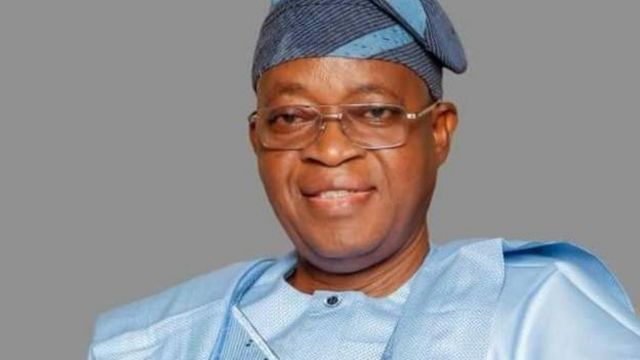
Minister of Marine and Blue Economy, Gboyega Oyetola
By Jadesola Jacobs
In May 2024, while speak ing at the sectoral first year ministerial briefing in Abuja, the Minister of Marine and Blue Economy, Adegboyega Oyetola, stated that a comprehensive process for the finalisation and validation of the National Policy on Marine and Blue Economy is expected to be concluded by the end of the year.
This national policy would drive the policy and strategic direction for the ministry to unlock potential in the maritime sector, while creating a more enabling environment for growth and development of the sector across all the value chains.
Since then, the Ministry has engaged all stakeholders, including experts, academia, and research institutions in assessing the current state of the sector, and finalizing work on the final draft.
The Federal Ministry of Marine and Blue Economy was established under the administration of President Bola Ahmed Tinubu in June 2023 to steer a thriving maritime and blue economy sector that advances sustainability, innovation and growth through its mandate, via harnessing Nigeria’s rich marine potential and resources for economic development.
Since the President appointed Oyetola as Minister in August last year, the ministry has recorded some great strides and continues to put in efforts towards actualizing its mandate to foster a dynamic, inclusive, and blue economy that improves national revenue by harnessing the country’s rich marine resources to improve livelihoods.
The potential for the marine and blue economy sector to create more jobs and transform Nigeria into a continental and global leader in sustainable marine practices is now being harnessed more than ever before. The Ministry has achieved a significant revenue increase from quarter one of 2024 compared with 2023.
The Minister noted that it has been able to achieve this by deploying blocking leakages, enhancing revenue generation from established sources, and rolling out new revenue sources, while engaging all relevant government agencies to ensure the full rollout of the National Single Window initiative.With its vast coastline, abundant water resources, and blue economy potential to spur overall economic growth and prosperity, this is good news for Nigeria.
As testament to the strides the ministry has undertaken since its establishment was its recognition as the overall Best performing Ministry in the country by the Presidential Enabling Business Environment Council (PEBEC) during its national awards in July. Similarly, NIMASA, an agency under the ministry, was named as the best Agency of Government in exemplary teamwork, quality service delivery and consistency.
At the awards, the Special Adviser to the President on PEBEC, Dr Jumoke Oduwole, also commended the Minister “for his commitment to ensuring that all the Agencies under the Ministry improve their service delivery in a consistent manner.”
Beyond official accolades, a thriving Marine and Blue Economy sector that contribute significantly contributes to the country’s GDP and so increase national revenue, will further help Nigeria to diversity its largely oil-based economy.
Earlier in June this year, Oyetola noted that the President Tinubu administration remains committed to addressing industry challenges to unlock the full potential of the maritime sector.
“We want to create an enabling environment that would foster investor confidence, promote transparency, attract the needed investments, and facilitate growth,” he said.
While the blue economy comprises activities such as maritime shipping; ship building and repairs, ports infrastructure and services; coastal tourism; fishing and aquaculture; offshore renewable energy generation, among others; the maritime shipping, port services, and fisheries and aquaculture subsectors are currently the most developed.
This is the more reason why tapping into the country’s abundant fishery resources, improving maritime sector and port services are major areas that the Ministry under Oyetola is paying premium attention to.
For instance, harnessing the country’s coastline stretching over 850 kilometres and its abundant fishery resources from Lagos to the Niger Delta and beyond will not only create more jobs and empower Micro, Small and Medium Enterprises (MSMEs), it will attract foreign investments, and improve revenue generation for sustainable economic growth.
However, the country’s fisheries sector has been plagued by inadequate infrastructure, outdated fishing tools and equipment and poor regulatory framework, which has stunted it growth for decades. With the mandate of the Marine and Blue Economy ministry in full gear, this is expected to witness a change and positive transformation in the next few years. Under Oyetola’s leadership, the Ministry has continued to prioritized strategic reforms to enhance operational efficiency and attract investments.
Just last month August, the Minister led a federal government delegation to honour the invitation of Moroccan government through its Minister of Agriculture, Fisheries, Water Resources, and for a visit. The purpose of the visit was to observe and gain insights into Morocco’s advanced fisheries management practices, port efficiency and infrastructure, and blue economy initiatives, while fostering bilateral cooperation between Nigeria and Morocco. The Ministry is now finalizing strategies on implementing key insights from that August visit.
Beyond fisheries, the Minister has reiterated, at different fora, the Federal Government’s commitment to enhance the country’s port infrastructure, which is one of its four pillars for transformation and advancing the country blue economy over a four-year period.
Under this pillar, the Ministry aims to rehabilitate and modernise existing port infrastructure while facilitating the development of new deep seaports, inland dry ports, and river ports, while also ensuring the connectivity of ports to roads, rail, and inland waterways.
At the first ministerial brief to the Federal Executive Council (FEC) on Marine and Blue Economy last year, the Minister had noted that “Opportunities abound to significantly enhance the contribution of the marine and blue economy to the country’s economic development agenda. This will help enhance government revenue; create jobs and sustainable livelihoods; and support the transition to renewable energy, among others.”
After just over a year of its establishment, it is safe to state that the Ministry of Marine and Blue Economy under Oyetola’s leadership is on the right track.
Disclaimer
Comments expressed here do not reflect the opinions of Vanguard newspapers or any employee thereof.